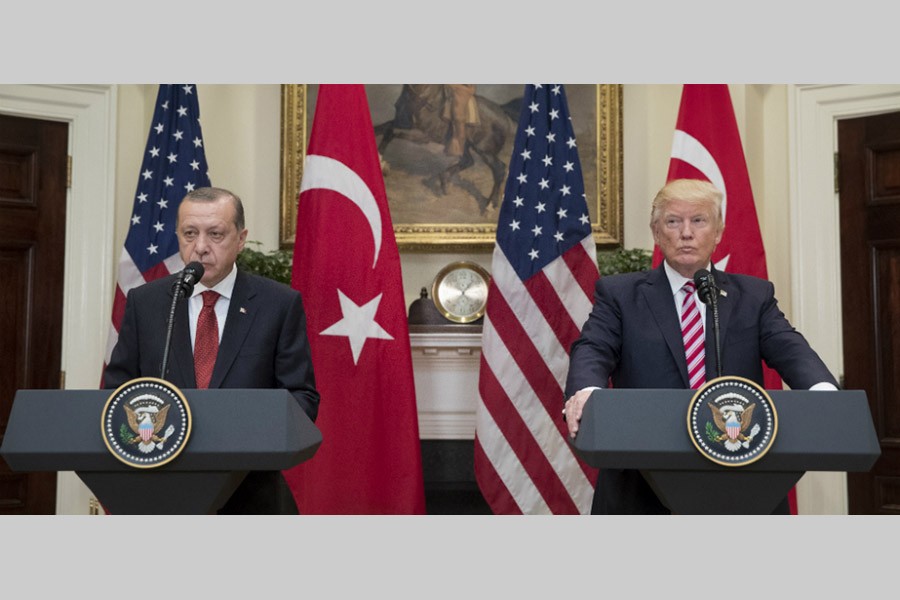During the first week of August, tensions between the United States and Turkey escalated in the midst of US sanctions. The issue: continued confinement of Andrew Craig Brunson, a Christian Pastor from North Carolina on terrorism and espionage charges linked to an abortive military coup of 2016 to overthrow the Erdogan government. Pastor Brunson ran a Protestant Church located in south-western Turkey.
US President Donald Trump raised the issue directly with Erdogan on several occasions. But the Erdogan government ignored US concerns and refused to return Pastor Brunson.
Erdogan demanded, if Washington required Ankara to discharge Brunson, it must at the same time deport the Turkish cleric Fethullah Gulen to Turkey. Gulen, exiled in Pennsylvania, is the alleged mastermind of the failed coup attempt. But, Washington did not comply.
To put renewed pressure on the Turkish government, White House spokesperson Sarah Sanders announced on August 1, that the US has enforced sanctions on Suleyman Soylu, the Interior Minister, and Abdulhamit Gul, the Justice Minister, for not releasing Pastor Brunson despite repeated demands. She added that the US would block "any property, or interest in US of the two ministers".
In a separate statement, Secretary of State Michael R. Pompeo said, "President Trump concluded that these sanctions are the appropriate action." Turkey's Justice Minister Gul instantly declared that he has no properties outside Turkey.
The Turkish parliament and foreign ministry strongly condemned the move and vowed to take retaliatory actions unless the sanctions are withdrawn. This escalated a diplomatic row between the two countries. In addition, Turkish Lira hit an all-time low in the midst of economic glitches. Turkey wanted to resolve the issue through effective diplomacy and constructive dialogue.
But, on August 4, Erdogan said in a speech at Ankara: "We have never bowed our heads to such pressure and will never do so." He emphasised that Turkey had been "patient" since the US sanctions against two of his cabinet ministers. In response to a similar move, Erdogan asked his government to "freeze the assets of America's justice and interior ministers in Turkey, if there are any." However, the personal sanctions were indeed symbolic.
Political analysts believe President Trump's Turkey sanctions have several geo-political ramifications.
A strategist at BlueBay Asset Management, Timothy Ash held, "It's pretty remarkable how far the Trump administration is willing to go - putting at jeopardy the relationship with a NATO ally over a Preacher."
First, the sanctions are imposed to muster support for Trump's domestic politics and intended to secure political advantage. Second, the evangelical voters would be very pleased to see Pastor Brunson freed from prolonged detention. Third, their votes are important for Trump's Republican Party in the forthcoming mid-term elections to the Congress.
Notably, Trump secured 81 per cent of evangelical Christian votes in the 2016 election. This rock-solid support is likely to increase in the mid-term elections for the Republicans if Pastor Brunson could be released promptly from Turkey.
Through the sanction policy, Trump administration has attempted to give another political message to Turkey: Turkey should not consider that its membership to NATO and alliance with the US to be a perpetual one. Notably, Turkey is the only Muslim nation in the NATO.
Trump had earlier threatened Turkey with tougher sanctions if it goes ahead with its strategy to purchase S-400 missile defence system from Russia. Turkey signed a $2.5-billion deal to that effect in December 2017 which the US termed "compromising NATO security." The US is also refusing to supply its F-35 fighter jets to Turkey unless it drops the missile system purchase deal. Furthermore, Turkey is also angry over the US backing of Kurdish insurgents in Syria.
If sanction threats and strained relations with the US continue, other big and regional powers like Russia, China and Iran, newly emerging economic partners of Turkey, would probably come forward to support her to satisfy their own geo-political and economic interests.
Thus, harsh sanctions have the potency to strain more than six decades of unceasing strategic partnership between Ankara and Washington.
Dr. Kamal Uddin Ahmed is a former Professor and Chairman, Department of Political Science, University of Dhaka.


